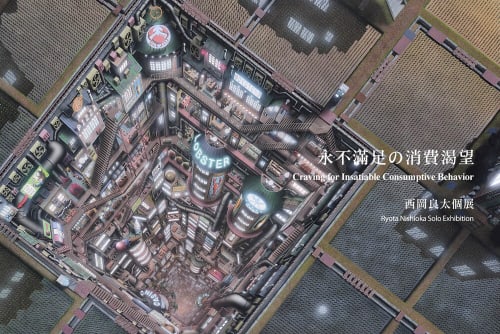永不滿足の消費渴望-西岡良太個展: Craving for Insatiable Consumptive Behavior - Ryota Nishioka Solo Exhibition
Past exhibition
Overview
■ 展期 Duration|2017 / 4 / 22 – 5 / 31
■ 開幕 Opening|2017 / 4 / 22 (Sat) 2 PM
■ 地點 Venue |大河美術 RIVER ART GALLERY
■ 地點 Venue |大河美術 RIVER ART GALLERY
西岡良太,1980年生於日本愛媛縣,畢業於高知大學國際社會交流系。創作以壓克力顏料為媒材,運用空氣噴槍及筆,在紙上描繪出仿若奇異世界的作品。在他所虛構的各式建築空間中,光影穿透其中,詭譎的氛圍中瀰漫著些許生冷與疏離之感。對他而言,在全白的畫紙上開始勾勒想像中的景色時,好似探訪一個陌生的國度,心頭不安卻又充滿期待。非本科系出身,透過勤奮自學練就了一手好功夫,創作態度嚴謹,筆觸細膩,由幻想堆疊而出的異境作品獨具個人風格。
此次個展以《永不滿足の消費渴望》為主題,呈現了西岡良太所幻想之充滿人造物的工業化世界。為了維繫大量生產與大量消費的經濟體制以滿足人類的需求,此世界中的人造物終日不停地勞動;而人類雖是此世界的主宰,卻也好似機器一般,日復一日地投入大量生產與大量消費的循環。然而,人類的需求永遠無法得到滿足,大量生產與大量消費的經濟體制只能繼續輪轉,宛如一場永無止盡的惡夢。他以人文關懷的視角,觸及了人類深受勞動制約的無奈,亦揣想著人造物辛勤勞動的心聲,期望在人與慾望的無盡交戰之際,重新理解人類的處境以及人類與人造物之間的關係。
Ryota Nishioka was born in Ehime Prefecture, Japan in 1980 and graduated from Kochi University, the International Communication Department. Based on acrylic colors, he uses airbrush and pen to create fantastic world on paper, which pervades a sense of cold and distant in weird atmosphere within his fictional architecture and space where light and shadow interweaved. To him, when he starts to outline imaginary scenes on plain paper, it seems like to explore an unknown land, which might upset him yet full of expectation. Though not graduated from any art related departments, he practices diligently by self-learning and leads to great skills. With conscientious attitude and delicate brushwork, he achieves a distinctive style in his foreign wonderland where imagine accumulated.
“Craving for Insatiable Consumptive Behavior”, the solo exhibition of Ryota Nishioka, presents an industrialized world full of man-made objects in his own imagination. In order to maintain the economic system of mass production and consumption to fulfill human needs, the man-made objects in this world work all day long; human devote themselves into the cycle of mass production and consumption day by day just like a machine even though they are the dominator of this world. However, human needs can never be satisfied and the economic system of mass production and consumption can only keep on cycling as if an endless nightmare. He not only touches upon human helplessness of being restricted by labor works but also imagines man-made objects’ true feelings of diligent working in humanistic view, hoping to reunderstand human condition and the relationship between human and man-made objects during endless wars between human and their desires.

